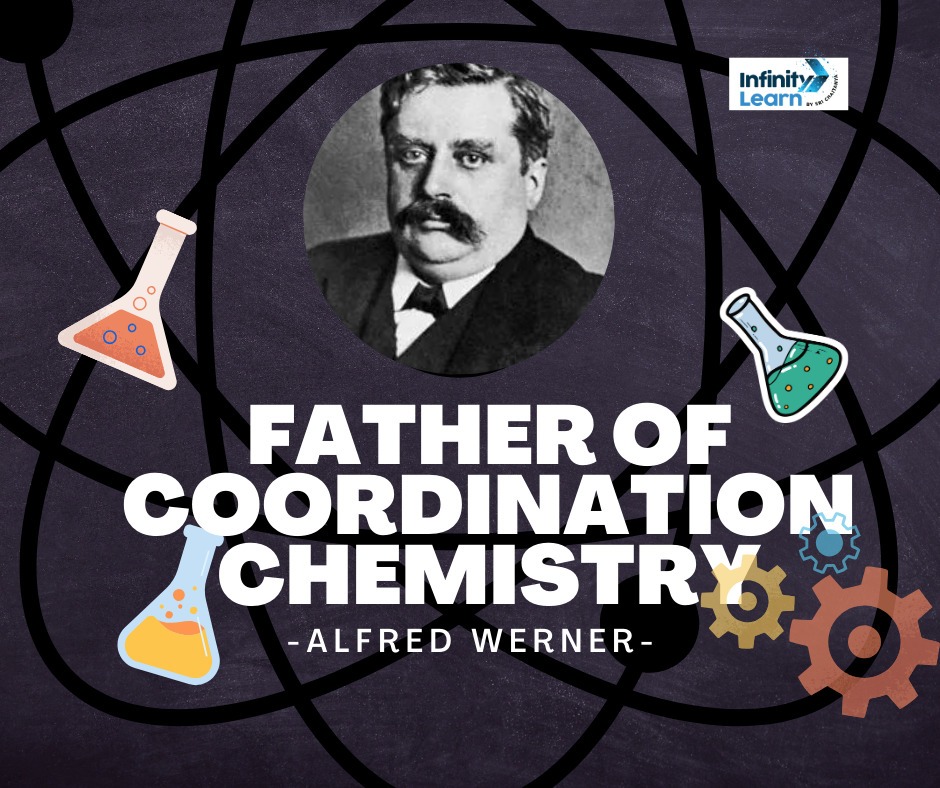Table of Contents
Coordination chemistry is an interesting area of science that studies how metal ions connect with surrounding molecules or ions, known as ligands. One of the most important figures in this field is Alfred Werner, who is often called the father of coordination chemistry.
Born in 1866 in Mulhouse, France, Alfred Werner made important discoveries that changed how we understand coordination compounds. His work laid the groundwork for modern coordination chemistry, and in 1913, he won the Nobel Prize in Chemistry, becoming the first inorganic chemist to receive this honor.

So, who is the father of coordination chemistry? Werner developed a complete theory explaining the structure and behavior of coordination compounds. His ideas challenged the existing beliefs of his time and opened new paths for research in inorganic chemistry.
In this article, we will look at Alfred Werner’s life and work, focusing on his key contributions and the basic ideas he introduced. By learning about the foundations he laid, we can better understand the growth of coordination chemistry and its importance in many areas, from materials science to biology.
Also Check – Who is the Father of GK
Father of Coordination Chemistry Overview
| Aspect | Details |
|---|---|
| Name | Alfred Werner |
| Born | December 12, 1866 |
| Died | November 15, 1919 |
| Nationality | Swiss |
| Field | Inorganic Chemistry |
| Key Contribution | Theory of Coordination Compounds |
| Major Achievement | Nobel Prize in Chemistry, 1913 |
| Key Concept | Central metal atom/ion bonded to surrounding ligands through coordinate covalent bonds |
| Impact on Chemistry | Laid the foundation for modern inorganic and coordination chemistry |
Key Contributions
- Theory of Coordination Compounds: Werner proposed the concept of coordination compounds, which involve a central metal atom or ion bonded to surrounding molecules or anions (ligands) through coordinate covalent bonds.
- Structure of Complex Ions: He demonstrated that the spatial arrangement of ligands around the central metal ion could be determined, leading to the understanding of geometric isomerism in coordination compounds.
- Nobel Prize: Awarded the Nobel Prize in Chemistry in 1913 for his work on the linkage of atoms in molecules and his theory of coordination compounds.
Important Concepts in Coordination Chemistry
| Concept | Description |
|---|---|
| Coordination Number | The number of ligands attached to a central metal atom. Common coordination numbers are 4 and 6. |
| Ligands | Molecules or ions that donate electron pairs to the metal. They can be classified as monodentate (one donor atom), bidentate (two donor atoms), or polydentate (multiple donor atoms). |
| Chelation | The process where a ligand forms multiple bonds with a metal ion, creating a stable ring structure. |
| Geometrical Isomerism | Different spatial arrangements of ligands around the central metal, leading to distinct compounds. |
Important Formula’s of Alfred Werner
General Formula for Coordination Compounds:[M(L)n]x+[M(L)_n]^{x+}[M(L)n]x+
- MMM = Central metal atom or ion
- LLL = Ligand (molecule or anion)
- nnn = Number of ligands
- xxx = Charge on the coordination complex
Example:[Co(NH3)6]3+[Co(NH_3)_6]^{3+}[Co(NH3)6]3+
- Central metal ion: Cobalt (Co)
- Ligands: Ammonia (NH3_33)
- Number of ligands: 6
- Charge: 3+
Legacy of Alfred Werner
Alfred Werner’s work revolutionized the field of chemistry by providing a deeper understanding of the structures and bonding in coordination compounds. His theories allowed chemists to predict and explain the properties and behaviors of a vast array of chemical substances, facilitating advancements in various scientific fields.
Father of Coordination Chemistry FAQs
Who is considered the Father of Coordination Chemistry?
Alfred Werner (1866-1919), a Swiss chemist, is considered the Father of Coordination Chemistry.
What was Alfred Werner's major contribution to chemistry?
Alfred Werner proposed the theory of coordination compounds, which explained the structure and bonding in complex inorganic compounds. He received the Nobel Prize in Chemistry in 1913 for this work.
When did Alfred Werner propose his theory of coordination compounds?
Alfred Werner proposed his theory of coordination compounds in 1893, which revolutionized the understanding of complex inorganic compounds.
How did Alfred Werner's theory impact the field of chemistry?
Alfred Werner's theory of coordination compounds provided a framework for understanding the structure and bonding in complex inorganic compounds, which had previously been a mystery. It laid the foundation for the development of modern coordination chemistry and had far-reaching implications in various fields, including biochemistry, catalysis, and materials science.









